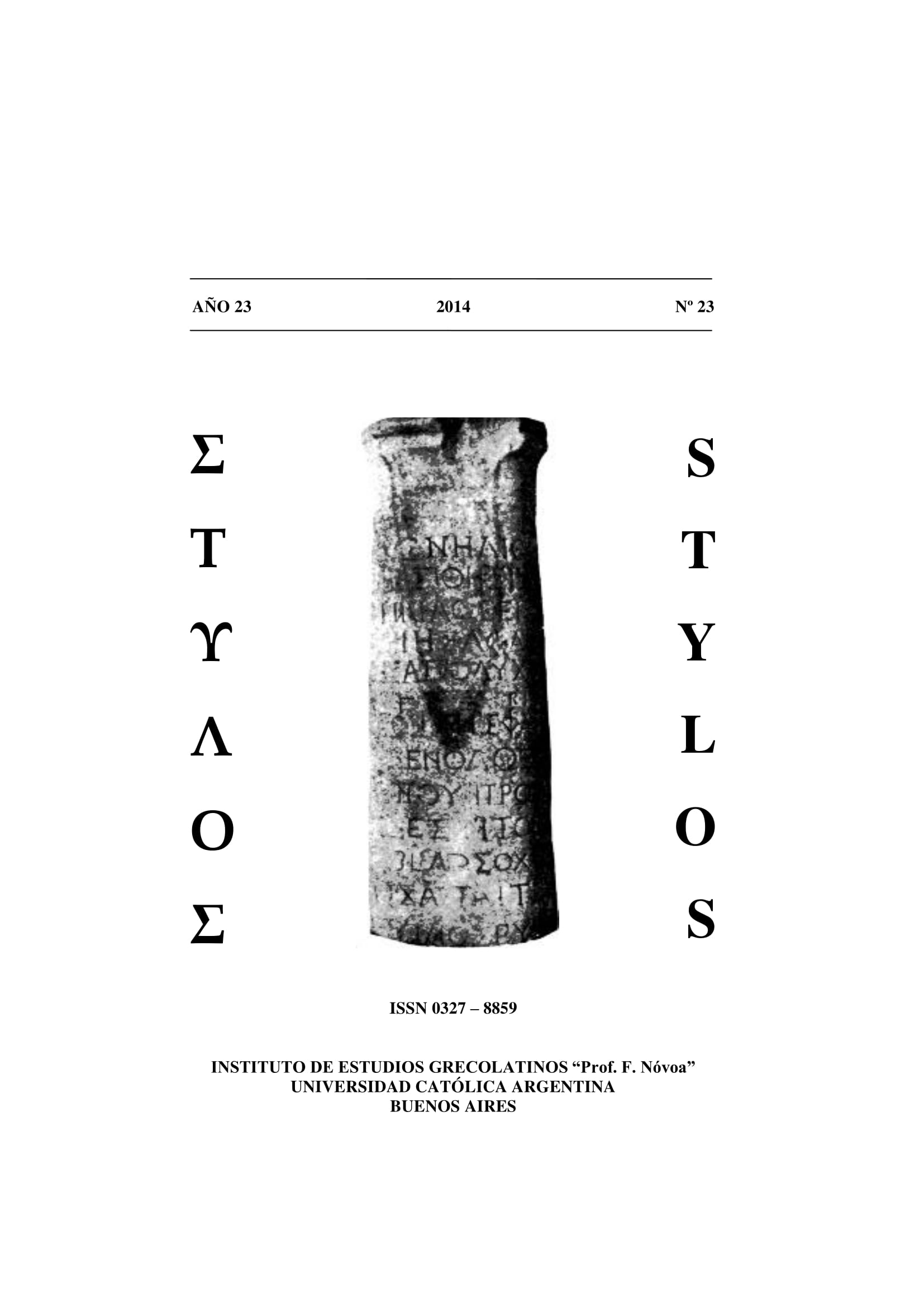LA CONFESIÓN EN EL SALMO 106 (107) DE LA TRADUCCIÓN JERÓNIMA IUXTA HEBRAEOS
Palabras clave:
salmo 106 (107), traducción, Vulgata iuxta Hebraeos, confiteor, dativo, misericordia, confianza.Resumen
El salmo 106 (107) es una confesión de la misericordia de Dios que hace desvanecer las necesidades y angustias de quien clama a Él en distintas instancias de su camino de purificación y perfección. A la vez que confiesa, exhorta a la confesión. Esta confesión está estrechamente unida a la confianza y al abandono en Dios a las que, a su vez, se dirige dicha purificación.
En la traducción jerónima iuxta Hebraeos hay marcas lingüísticas que indican el sentido de esta confesión, especialmente mediante la estructura confiteor + dativo.
Descargas
Citas
TEXTO PRIMARIO
Salmo 107 (106), Liber Psalmorum iuxta Hebraeos:
Hieronymus Vulgata - Psalmorum Liber, http: //www.intratext.com/IXT/ LAT0001/_PGY.THM (consultado el 7 de febrero de 2011).
HARDEN, J.M. (ed), Psalterium iuxta Hebraeos Hieronymi, London: Society for Promoting Christian Knowledge (New York and Toronto: The Macmillan Co.), 1922.
OTRAS EDICIONES DE LAS SAGRADAS ESCRITURAS
Bible Suite – Hebrew Study Bible (herramientas informáticas para el estudio de la Biblia, con análisis lexico del texto hebreo) http://study.interlinearbible.org/psalms/107.htm (consultado 2 de febrero de 2013).
Biblia de Jerusalén, Bilbao: Editorial Española Desclée de Brouwer, 1976.
MANRESA, P. RUPERTO Mª DE (O.M.C.). El libro de los Salmos: versión según el texto hebreo. Barcelona: Librería Bastinos de José Bosch, 1935, Tº II.
Nova Vulgata, http://www.vatican.va/archive/bible/nova_vulgata/ /documents/nova-vulgata_index_lt.html (consultado el 7 de febrero de 2011) .
SCIO, FELIPE (editor y traductor), La Sagrada Biblia traducida al español de la Vulgata latina, y anotada conforme al sentido de los Santos Padres y espositores católicos por el Ilmo. S.r D. Felipe Scio de San Miguel, ex-provincial del órden de las escuelas pías de Castilla, y obispo de Segovia, Barcelona: A. Pons y C.a, Libreros-Editores, MDCCCXLIV, Tomo III del Antiguo Testamento.
STRAUBINGER, MONS. JUAN (traductor y comentarista), La Santa Biblia. Traducción directa de los textos primitivos. La Plata: Universidad Católica de La Plata, 2007.
TWEEDAL, MICHAEL, Biblia Sacra juxta Vulgata Clementinam - editio electrónica, with approval of the The Bishops’. London: Conference of England and Wales, 2005.
DICCIONARIOS Y OBRAS DE GRAMÁTICA DE LA LENGUA LATINA
DÍAZ PATRI, P. GABRIEL, Curso de latín eclesiástico, Buenos Aires: Instituto de Estudios Filosóficos “Santo Tomás de Aquino”, 1996.
ECHARTE COSSÍO, MARÍA JOSÉ. “Sobre el valor del dativo en latín. El lla-mado dativo de dirección y el dativo con verbos prefijados.” En Minerva: Revista de filología clásica, ISSN 0213-9634 (Universidad de Valladolid), 1994; nº 8: 211-242.
FORCELLINI, AEGIDIUS. Totius Latinitatis Lexicon, Prati : Alber Ghettus et soc., 1865, T. III.
LÓPEZ GARCÍA, ÁNGEL. Cómo surgió el español: introducción a la sintaxis histórica del español antiguo, Madrid: Gredos, 2000.
Oxford Latin Diccionary, Oxford: Oxford University Press, 1968.
VALPY, REV. F. V. J., An Etymological dictionary of the Latin Language, London: printed by A J. Valpy, 1828.
OBRAS ACERCA DEL SALTERIO
BEA, AGUSTÍN. El nuevo salterio latino: aclaraciones sobre el origen y el espíritu de la traducción. Barcelona: Herder, 1947.
Gran Enciclopedia RIALP, Madrid: Ed. Rialp, 2ª reimpresión, 1981.
HIPONA, SAN AGUSTÍN DE. Obras de San Agustín. “Enarraciones sobre los Salmos (3º)”, ed. bilingüe, P. Balbino Marín Pérez O.S.A. (editor), Madrid: B.A.C., 1966, Tº XXI.
OTRAS OBRAS CONSULTADAS
GORAÏNOFF, IRINA. San Serafín de Sarov. Buenos Aires: Ediciones Paulinas, 1983.
LEÓN, FRAY LUIS DE. De los nombres de Cristo. Madrid: Ed. Espasa-Calpe, 1938.
LISIEUX, TERESITA DE. Historia de un alma. Buenos Aires: Ed. Claretiana, 2003.
MARMIÓN, DOM COLUMBA. Jesucristo, Vida del alma. Pamplona: Fundación Gratis Date, 4ª ed, s.a.
SOPHRONY, ARCHIMANDRITA. Ver a Dios como Él es. Salamanca: Eds. Sígueme, 2002.
Descargas
Publicado
Cómo citar
Número
Sección
Licencia






